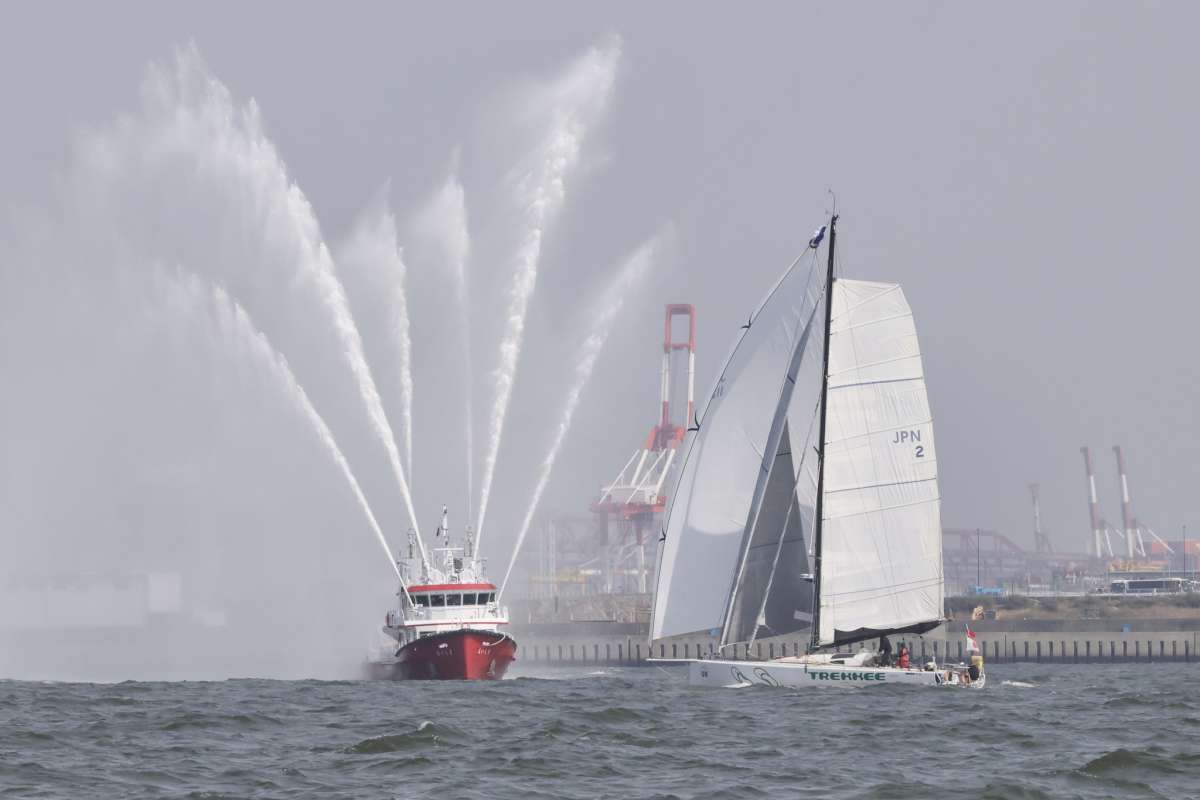New Zealand 18ft skiff teams return to the JJs
When COVID-19 struck Sydney during the JJ Giltinan World 18 footer Championship in March 2020, it not only ended the three consecutive winning streak of the champion New Zealand Honda Marine team, the resulting pandemic also put an end to the immediate future of Kiwi challenges.
But that’s all about to change in March 2024, when for the first time since that ‘crazy’ 2020 regatta, a three-pronged New Zealand group of young 18ft skiff crews are back to resume the regular ANZAC challenge, which goes back to the original World 18 footer Championship in 1938.
The Auckland Skiff League fleet has been in rebuild mode during 2023-24 since the sailors were forced into lockdowns for three seasons, but with everything now back to some kind of normal, a small but enthusiastic group is ready to take on the might of the world’s best 18ft skiff teams from Australia, Germany, UK and Denmark, on Sydney Harbour from March 1-10.
According to Suellen Hurling, at Live Sail Die, “re-building the local fleet, which is based out of Royal Akarana Yacht Club, in Auckland, has been a work in progress, which began in October 2022 when the decision was made that it was time to get back on the 18-foot skiff horse.”
Fleet Manager Graham Catley, who has been such an incredible force behind the successful New Zealand challenges since the early 2000s, reached out to Suellen and Live Sail Die “to find sailors to race in the four workable boats in the fleet.”
“Since then, several sailors have tried the 18-foot skiffs, with regular racing happening on Friday evenings and Sunday afternoons, and from these sessions, four teams were created, with three claiming a ticket for their boats to head to Sydney.”
It’s been a short, sharp season for the New Zealand 18-Foot Skiff teams who are in the “rebuild the fleet stage” but Graham Catley told Live Sail Die “we are so excited to be heading back to Sydney for the JJs with a brand new line up of sailors. It will be baptism by fire for these young guns!”
The selection wasn’t based on results, but rather the willingness to give it everything they’ve got to represent New Zealand at the JJ’s.
According to Suellen, who works alongside the team to capture the action and promote the class “we are going into the JJ’s as the underdogs, that’s for sure. We’ve got three teams who are pretty pumped to head to Sydney to race, but with only having a small fleet here in Auckland, they are going in eyes wide open for the JJ’s.”
The three New Zealand teams, in the 26-team fleet from five countries at the 2024 JJs, are:
ASCC, Eli Liefting, Adam Mustill, Josh Schon
ASCC2, Craig Keenan, Sam Richardson, Gavin Ninnes
RAYC, Jack Frewin, Ollie Gilmour, Luc Gladwell
Only Eli Liefting has competed at a previous JJs regatta when he crewed with Peron Pearse and Harry Clark on Maersk Line in 2020.
Seven-times JJ Giltinan World 18ft Skiff champion and SailMedia Livestream commentator Andrew ‘Bucko’ Buckland is someone who is supportive of New Zealand sailing talent and what the Kiwis have achieved over the 86 years of the JJ Giltinan world championship.
According to Andrew, “Who can forget the impact that the NZ trio of Josh Porebski, Jack Simpson and Dave Hazard had on the 2019 JJ Giltinan series by winning heat one in virtually their first 18 skiff race on Sydney Harbour; the crew anxiously checking the course sheet when leading up the last windward beat.”
“But of course the Kiwi impact has always been around in both design and innovation – immediately post WWII Jack Logan’s Komutu skimmer type and then a long string of influence probably capped by the efforts of Bruce Farr and Russell Bowler; Russell pioneering the now universal sandwich construction and Bruce advancing almost every other facet of skiff design.”
“Somewhere prior, credit should also lie with John Spencer, who developed light ply construction in yachts and skiffs; while also developing two smaller designs (the Cherub and Javelin) which provided a substantial part of the foundations for modern skiff and yacht design.”
New Zealand’s contribution to the 18s since the 1930s has been outstanding.
After accepting the invitation to compete at the inaugural championship in 1938, New Zealand were soon on the ‘winner’s list’ when Gordon Chamberlin’s Manu won a controversial 1939 regatta at Auckland, however the Kiwi contribution to the class goes well beyond names on a winner’s list.
Jack Logan was the next Kiwi winner when he built a round bilge skimmer, named Komutu, which had a transom bow and was based on a fifty-year-old design by his father. The boat was rigged with the latest Bermudan rig and dominated the 1950 contest, which was sailed in Auckland.
The Canterbury region, on New Zealand’s South Island, entered the World Championship for the first time, at Suva Fiji, in 1952 with a radical cedar-planked boat, named Intrigue, which was skippered by Peter Mander.
Intrigue arrived in Fiji with a new a rotating mast, a bigger sail plan, a new set of sails and trapeze wires, plus a number of other modifications to her earlier Auckland trials, and was labelled ‘the gadget boat of all time’.
Intrigue introduced a two-man trapeze system for the first time in the 18 footers and became the 1952 champion. She successfully defended her title in 1954, now with three on trapeze and, incredibly, a fourth man lying out on top of a trapeze man.
The next big input from New Zealand came in the late 1960s-early 1970s when a young designer-skipper Bruce Farr skippered Guinness Lady into third place at the 1969 Worlds in Brisbane. His challenge would have been even stronger had it not been for gear failures in each of the first two races, which ruined his chance of victory, before he recorded two wins and a second placing in the final three races.
It was the first sign that the 1970s decade would become New Zealand’s ‘Golden Era’ of the World 18 footer Championship boat designs, construction and championship winner’s list.
At the 1977 regatta in Auckland, Russell Bowler sailed a revolutionary Benson & Hedges skiff, which was a very small, light, round-bilged hull which pioneered a polystyrene core sandwiched by a thin fiberglass laminate, and was said to be one-third lighter than the plywood New Zealand boats.
The boat impressed Australia’s leading skippers so much that similar type hulls were built for the following season to replace the lightweight moulded-timber construction. It changed 18 footer hulls forever.
After a lengthy period when the kiwis suffered a lack of success, Graham Catley, along with Alex Vallings (C-Tech), created the opportunity for young New Zealand sailing talent to compete at the highest level again.
Graham became the driving force responsible for taking New Zealand back to the very top of 18ft skiff racing when he organised sponsorships and commissioned Brett Van Munster to build the hulls. Alex Vallings was critical to the rigging, and a leading challenger on the water against the ‘might’ of the local Australian fleet.
As a result of their efforts, New Zealand reached its greatest height in the 18 footers when David McDiarmid, Matthew Steven and Brad Collins won three consecutive JJ Giltinan World Championship regattas in 2018, 2019 and 2020 in Honda Marine and, but for COVID-19, could have extended the run beyond the three victories.
The League’s spectator ferry will follow the action, leaving Double Bay Public Wharf at 2.15pm.
Tickets are available https://18footers.com/18-footer-racing/spectator-ferry/
If you can’t get out onto Sydney Harbour, you can still watch the SailMedia Livestream camera cat coverage of all the racing action by going to
http://youtube.com/video/HzCyLPZxnKg/livestreaming
Frank Quealey
Australian 18 Footers League Ltd.






































